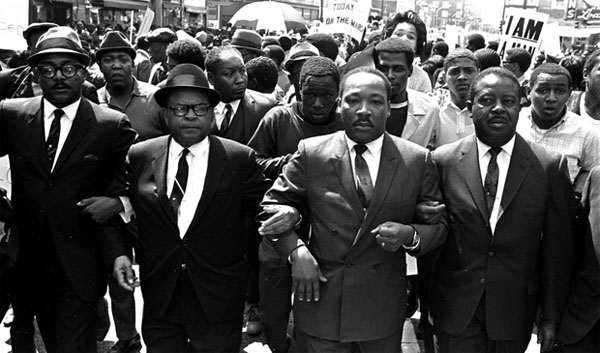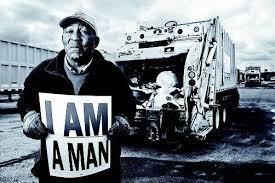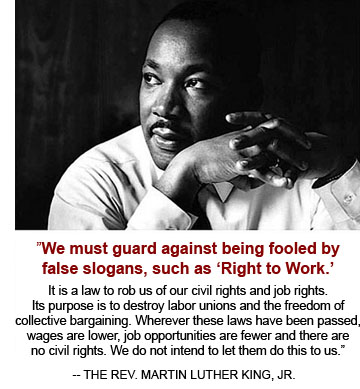OPINION
MLK knew unions are vital voice for workers
By TINA MORRISON
(April 6, 2018) — I’ve served as an officer of the Professional Musicians AFM Local 105 since being elected in 1998, was elected to the international executive board of the American Federation of Musicians (AFM) in 2010, and then elected to serve as secretary treasurer of the Spokane Regional Labor Council and the executive board of the Washington State Labor Council in 2015.
Please note: Unions are not separate from members – members are the union. Officers are elected by members to represent them, and staff is hired to do necessary work related to the collective bargaining agreement. Agreements are not one-sided; the employer and the union agree to the terms and conditions in the CBA.

This discussion is timely this week as we commemorate the 50th anniversary of the death of Dr. Martin Luther King Jr., who was murdered in Memphis, Tenn., while supporting the striking sanitation workers who won union recognition as members of the American Federation of State, County and Municipal Employees Local 1733.
The Janus v. AFSCME case currently being considered by the Supreme Court may be set to undermine part of what was fought for and died for in 1968: dues check-off. As a member of the AFM Diversity Committee, I had the privilege of attending an event on the 40th anniversary of the sanitation workers strike in Memphis. I heard stories told by a panel of the strikers and remember what they said about the importance of dues check-off to fund their union and sustain their hard-fought gains.
 Why were they striking? Two of their workers were killed by a truck that was old and malfunctioning, which the city wouldn’t replace. Two others had been killed previously in a similar accident, and others had lost limbs in part due to old and poorly maintained equipment, along with a list of other abuses. The city wouldn’t listen to their requests so they knew they had to form a union to make their voices heard.
Why were they striking? Two of their workers were killed by a truck that was old and malfunctioning, which the city wouldn’t replace. Two others had been killed previously in a similar accident, and others had lost limbs in part due to old and poorly maintained equipment, along with a list of other abuses. The city wouldn’t listen to their requests so they knew they had to form a union to make their voices heard.
This is the “Sanitation Workers’ Prayer,” as recited by the Rev. Malcolm Blackburn (“Henry” is Henry Loeb, Mayor of Memphis in 1968, and “C.O.M.E.” stands for “Community on the Move for Equality.”)
Our Henry, who art in City Hall,
Hard-headed be thy name.
Thy kingdom C.O.M.E.
Our will be done,
In Memphis, as it is in heaven.
Give us this day our Dues Checkoff,
And forgive us our boycott,
As we forgive those who spray MACE against us.
And lead us not into shame,
But deliver us from LOEB!
For OURS is justice, jobs, and dignity,
Forever and ever. Amen. FREEDOM!
Also in 1968, the National Right to Work Legal Defense Foundation was formed. According to its website, it is “a nonprofit, charitable organization. Its mission is to eliminate coercive union power and compulsory unionism abuses through strategic litigation, public information, and education programs.” I could have simply said, “according to their website their mission is to eliminate union power through strategic litigation.”
Richard Janus, the petitioner in Janus v. AFSCME, is being represented by William Messenger, staff attorney for the National Right to Work Legal Defense Foundation. Don’t be fooled: The Janus decision is not about free speech or worker “freedom.” It is about undermining the voice of workers through “strategic litigation.” In a nutshell, Janus wants the benefits negotiated by the union but doesn’t want to pay for them, infringing on the rights of the union members, imposed not just in his state, but nationally, which is what the National Right to Work Legal Defense Foundation has been working on for 50 years.
 States can vote to enact “right to work” (a brilliant misnomer) legislation. The Supreme Court, if it decides in favor of the petitioner, would be taking away the states’ right specifically for public-sector workers, reversing previous Supreme Court decisions. So-called “right to work” legislation doesn’t remove unions, it provides that unions are required to negotiate, maintain and enforce contracts whether or not all of the workers they represent pay the costs. In other words, the members pay, and other workers covered by the contract would have the same benefits as the members without paying. Currently, in Washington state, workers who choose not to be members pay the costs directly related to maintaining the CBA.
States can vote to enact “right to work” (a brilliant misnomer) legislation. The Supreme Court, if it decides in favor of the petitioner, would be taking away the states’ right specifically for public-sector workers, reversing previous Supreme Court decisions. So-called “right to work” legislation doesn’t remove unions, it provides that unions are required to negotiate, maintain and enforce contracts whether or not all of the workers they represent pay the costs. In other words, the members pay, and other workers covered by the contract would have the same benefits as the members without paying. Currently, in Washington state, workers who choose not to be members pay the costs directly related to maintaining the CBA.
Unions are instrumental in leveling the playing field in the workplace, particularly for women and people of color, and provide protections against discrimination based on sexual orientation. Unions provide an important voice for worker safety at the local, regional, state and national levels. You’re welcome to join us as we hold our Workers Memorial Ceremony in Mission Park on Saturday, April 28 commemorating the workers who died due to work-related illness or injury during 2017 in Washington state. “Mourn the dead. Fight for the living.”
 Tina Morrison is secretary-treasurer of the Spokane Regional Labor Council. This column is adapted from one that was published last month in The (Spokane) Spokesman-Review.
Tina Morrison is secretary-treasurer of the Spokane Regional Labor Council. This column is adapted from one that was published last month in The (Spokane) Spokesman-Review.





